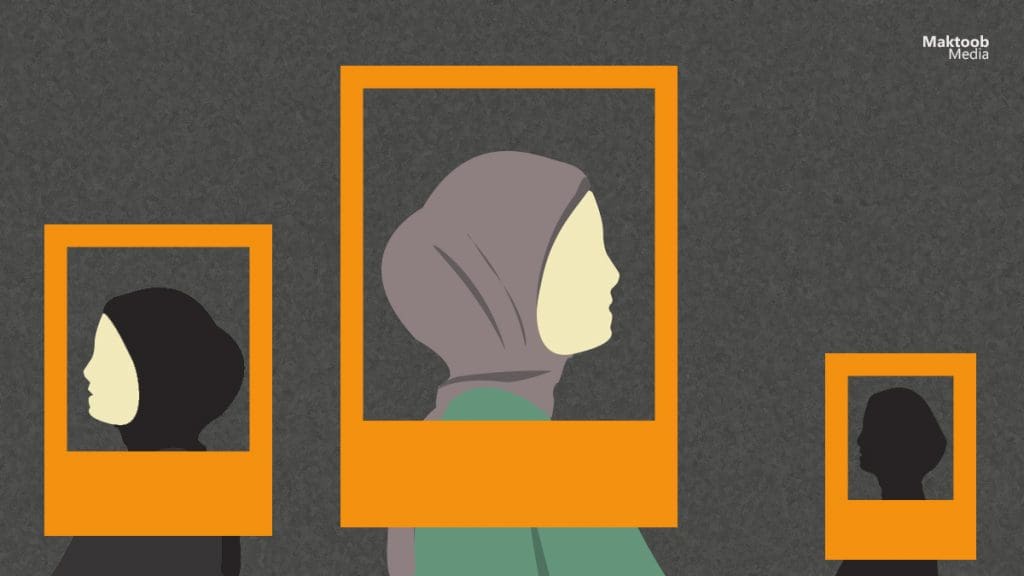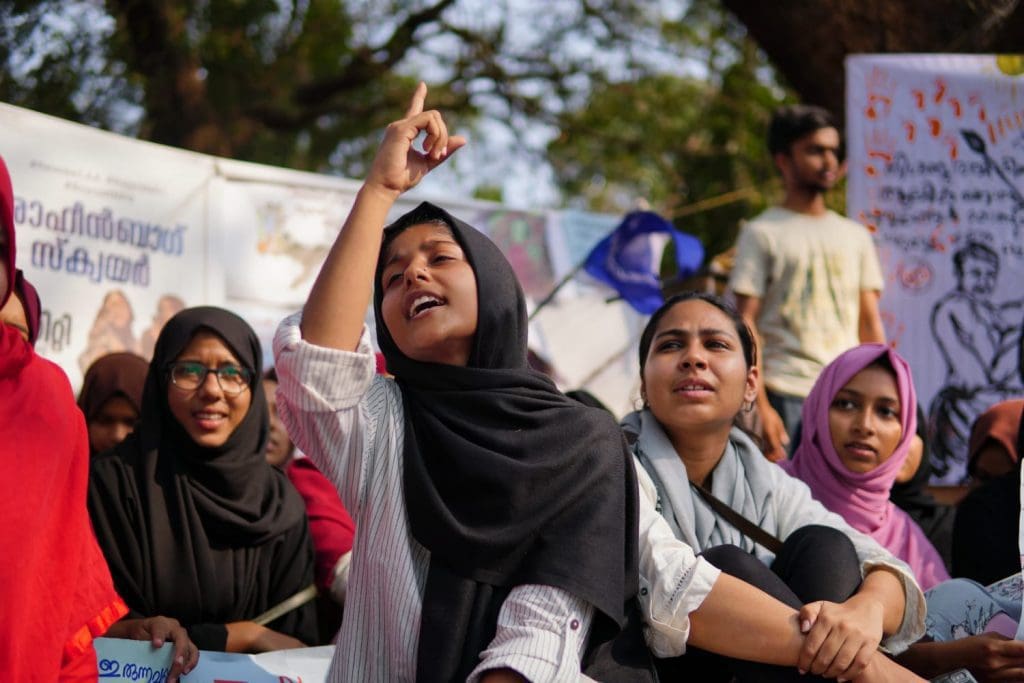
In the name of Allah. The usage of this small prayer of remembering God before starting anything in the Islamic faith is an attempt and an intentional assertion. An attempt to normalise the presence of my faith in public spaces. An intentional assertion of my being, my existence, myself, a Muslim and a woman.
On the intervening night of 4th and 5th July 2021, more than 80 Muslim Women, including myself were doxed, borderline trafficked, and auctioned on an open-source website ‘Sulli Deals’ hosted by Git hub. A hate crime against women of the Muslim community. I am sure many must already know of this. But from the many who knew of this only a few spoke about it. And from the few who spoke about it, only a few understood the central identity that was attacked with the creation of that website.
Identifying the centrality of Muslimness in the creation of the website and the subsequent auction of Muslim women is extremely important because this incident did not happen in isolation. There have been many instances of violent attacks that the Muslim community has faced and survived. One can chart it back to the formation of RSS (Rashtriya Swamsevak Sangh), to the creation of the ‘Muslim’ other when the Indian state came into existence, to the anti-Muslim pogroms; to Gujarat 2002, to Delhi 2020, to the everyday persecution, otherization, humiliation, and dehumanisation that the Muslim community has been subjected to.
The radicalised Hindu ecosystem is inherently anti-Muslim and has an increasing acceptance of the Hindu majority. Extremely violent hate speeches against the Muslim community have been normalised, from ministers of the parliament to the next-door Hindu neighbour, everyone enjoys a power backed impunity that enables them to be violently Islamophobic. It is the same sentiment and impunity that led to the auction of Muslim Women on Eid on a YouTube live and the recent creation of a website where Hindu men could find their “deal of the day”. Muslim women have been an object that can be sexualized to demean and further humiliate the Muslim community. In 2019, when article 370 was abrogated, revoking the special status of Kashmir, ministers of the ruling political dispensation gave statements about finally being able to marry white-skinned Kashmiri Muslim Women. This sexualization happens against the backdrop of anti-Muslim hatred, misogyny, and sexism.
Nothing Happens in Isolation
On the afternoon of 04 July, many heard the news of a Mahapanchayat at Pataudi, Haryana by Hindu nationalists. Rambhakt Gopal, who had earlier fired at protesting students of Jamia Millia Islamia, injuring one of the students during the anti-CAA protests, gave a speech at the said Mahapanchayat, calling for the abduction of Muslim women. “Arey tum Salma ko lekar to aao”, he said and the crowd of thousands cheered. Not a single word of his speech was not outrageous or extremely inflammatory.
Later at night, the ‘sulli deals’ website came into light, that had stolen pictures of Muslim women from their social media handles and auctioned them. It was nothing less than online trafficking. The website might have been live way before 04 July, but its contents only came to public light and on social media after that speech. It is unfair to not see both as connected and part of the same problem. It is the impunity, audacity, and support with which Gopal spoke that strengthened the Hind men, who may or may not have indulged in the dealings of that website earlier, to publicly post their ‘deals’. The Mahapanchayat and the website, both display the violent manifestation of Islamophobia, received little or no condemnation. Any outrage over both was by the Muslim community, which here is the targeted community.
These are just two examples from a non-exhaustive list of examples of hate crimes directed at the Muslim community in India. It is imperative that we understand that from the utterance of slurs like ‘Sulli’, by someone who would probably be seen as an insignificant faceless fringe to violent actions of beheading and lynching of Muslims, again by some insignificant faceless fringe, are all linked and are not happening in isolation. It is also imperative to note here itself that this fringe is very much the mainstream. It is almost impossible to divorce BJP’s electoral wins from the mass radicalisation of the Hindu majority.
Violent Otherization through Social Media Ecosystem
Social media has been made a huge medium for sharing politically charged content that is anti-Muslim in nature. This content generally contributes to opinion building. Images are created and circulated to incite feelings of hatred. Thus, this consumption of images and videos which are violent in nature, whether the violence is overtly displayed or it is shown through broken bodies. Similar is the manner in which videos of lynchings are shared extensively on social media, with people deriving power and pleasure out of the sharing of brutal images. Pehlu Khan’s video of being lynched or Shambhu Lal Regar’s video of burning a Muslim man alive was shared widely among networks. By viewing these videos, the audience invariably participates in such events. The act or performance of lynching and murder is succeeded by multiple violations as the video circulates. This is an example of how various media technologies and platforms enable in performing the victimisation of marginalised bodies, here Muslim bodies.
In addition, there is a systematic deliberate circulation of such images and videos to give a larger message of political support. Where the perpetrators do not hide their crimes but in fact pride over it and leave live videos on their social media, which is then circulated, and the perpetrator has seen an avenger of Hindu dharma. This has become an industry of hate that incentivises these crimes against Muslims, the more anti-Muslim you are the more legitimacy and acceptance you will have within the Hindu majority. For instance, the Chief Minister of Uttar Pradesh, Ajay Singh Bisht, who was once considered a fringe criminal is now the Chief Minister of the most populous state in India. Many such examples can be traced to Hindus deriving power and popularity.
The ‘sulli deals’ website is a kind of violence inflicted on our already marginalised bodies. Muslim women are only seen as bodies that should satisfy the lustful male gaze of Hindu men. The photos as it gets shared renders us without any agency, our privacy is violated, and a sense of powerlessness comes into play. Many Twitter handles claimed ownership of the app deriving power from the act itself.


The distance and anonymity of being the unobserved observer give the viewers superiority over that which is exposed, while rendering them completely powerless to affect the events on screen but also in other ways, giving them a certain ability to act and participate in the consumption of such an act, which is akin, as said earlier, to a repetition of the act. In this context, technology does not facilitate the loss of the identity, but provides validation to the voyeur, of seeing his imagination on screen in the vulnerable de-humanised subject of violence. Islamophobia or even misogyny or sexism on social media is a part of this system which creates a discourse that further creates a collective behaviour of a society.
Three Complete Months
Three months on, after repetitive outrage, complaints about legal action, national and international media coverage, Muslim women are well aware that there might never be an end to this terrorising sexualization. A number of offline and online complaints have been registered but no action, investigation, arrests have happened so far. My online complaint at the cyber cell has been “closed” without the police reaching out even once. We, Muslim woman, risk our lives every time we step out, we risk our lives every time we write a tweet or post on Facebook, but we simply refuse to be cowed down.
Still, many from the majority who disapprove of such acts of violence, consider only the BJP/RSS as the problem. The problem with this is that they are not just downplaying the mass radicalisation that manifests itself everyday but also infantilising the Hindu majority. BJP/RSS may be the source of hatred against the Muslim community but this hate has been seeded so deep within that it has become difficult to differentiate between those who actively perpetuate (Hindutva) and those who silently approve (Hinduism). Silence at the time of oppression is approval and participation. Token solidarities find their way to us but unless and until the Hindu majority collectively decides a course correct, rejects the hate and otherization, and actively deradicalizes within, such incidents of hate and violence will not stop.



